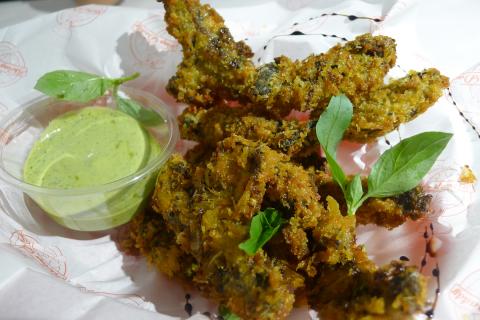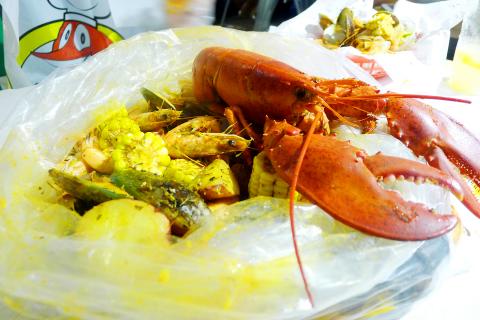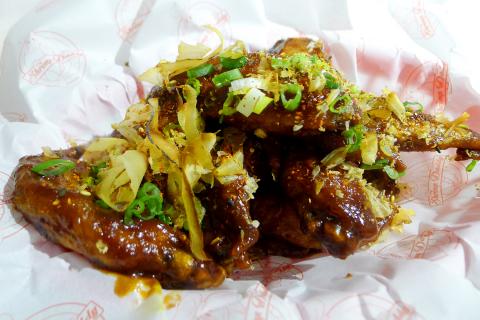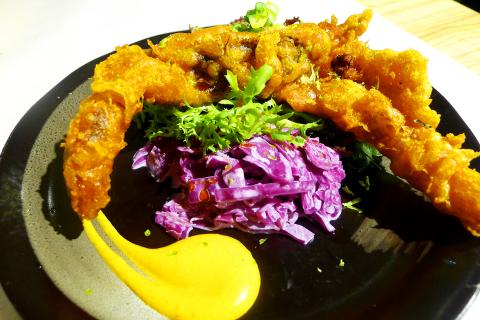Put your bibs on because there are no plates at The Shrimp Daddy — and things can get pretty messy. The recently opened bayou-style seafood restaurant offers an appealing US Deep South dining experience.
The Shrimp Daddy’s decor is clean and minimal — similar to the rustic vibe of many traditional Taiwanese seafood restaurants. Concrete floors complement white walls, and there is a stack of wooden seafood crates in one corner that will eventually adorn one of them. An oversized chalkboard displays specials along another. The tables are topped with Napkin dispensers and paper tablecloths. You don’t need much more, except an accessible sink, located at the back, since you are encouraged to eat with your hands. Plastic gloves are available if you’re worried about your manicure.
Appetizers, most of which are fried, come delivered in brightly-colored plastic baskets lined with paper. The fish (NT$250), soft-shell crab (NT$290) and fried oysters (NT$290) were particularly memorable because of the different batters, and the dipping sauces that accompanied them: basil, kaffir, and lime aioli, honey wasabi, Sriracha aioli and more. The animal-shaped fries (NT$160) came topped with large portions of caramelized onions, cheese sauce, gravy and big chunks of soft and succulent pork belly. They tasted out of this world.

Photo: Olivia Wycech
The gumbo (NT$180) is a must, but if go on a day when lobster bisque (NT$180) is on special, then opt for this rich and creamy soup. There are wings, too, and they come either in a spicy sauce or a miso/honey/togarashi blend and then sprinkled with bonito flakes (NT$230).
The heart of the meal was the southern boil (NT$1380 to NT$7088). We ordered the lobster, which was large, meaty and moist. The waiter arrived with a steaming bag of shellfish and we went to work. It’s a hands-on approach to digging, cracking, peeling and then eating a melange of crustaceans and shellfish, as well as chunks of corn on the cob, sausages and potatoes.
There are other options besides lobster to base your boil on, like Alaskan king crab or Vannamei shrimp. You can also choose your seasoning. We went with the “daddy’s shebang.” It was a little bit buttery, a little bit garlicky, with lots of Cajun zing — big clumps of creole-style herbs were studded throughout. We went easy on the spiciness, so there was almost zero firepower. I wouldn’t hesitate to try the medium or even spicy.

Photo: Olivia Wycech
One small quibble was that it lacked the kind of citrus punch I like, a problem solved with the addition of fresh lemon wedges.
I highly recommend The Shrimp Daddy to anyone except those who might have a corporate meeting afterwards. You leave smelling like the south — and very full. If you still have room, however, there is a limited selection of desserts. The Shrimp Daddy, whose mantra playfully reads Who’s YOUR Daddy, is just as much about the food as it is about the experience, and it wins on both counts.

Photo: Olivia Wycech

Photo: Olivia Wycech

The 2018 nine-in-one local elections were a wild ride that no one saw coming. Entering that year, the Chinese Nationalist Party (KMT) was demoralized and in disarray — and fearing an existential crisis. By the end of the year, the party was riding high and swept most of the country in a landslide, including toppling the Democratic Progressive Party (DPP) in their Kaohsiung stronghold. Could something like that happen again on the DPP side in this year’s nine-in-one elections? The short answer is not exactly; the conditions were very specific. However, it does illustrate how swiftly every assumption early in an

Towering high above Taiwan’s capital city at 508 meters, Taipei 101 dominates the skyline. The earthquake-proof skyscraper of steel and glass has captured the imagination of professional rock climber Alex Honnold for more than a decade. Tomorrow morning, he will climb it in his signature free solo style — without ropes or protective equipment. And Netflix will broadcast it — live. The event’s announcement has drawn both excitement and trepidation, as well as some concerns over the ethical implications of attempting such a high-risk endeavor on live broadcast. Many have questioned Honnold’s desire to continues his free-solo climbs now that he’s a

Francis William White, an Englishman who late in the 1860s served as Commissioner of the Imperial Customs Service in Tainan, published the tale of a jaunt he took one winter in 1868: A visit to the interior of south Formosa (1870). White’s journey took him into the mountains, where he mused on the difficult terrain and the ease with which his little group could be ambushed in the crags and dense vegetation. At one point he stays at the house of a local near a stream on the border of indigenous territory: “Their matchlocks, which were kept in excellent order,

Jan. 19 to Jan. 25 In 1933, an all-star team of musicians and lyricists began shaping a new sound. The person who brought them together was Chen Chun-yu (陳君玉), head of Columbia Records’ arts department. Tasked with creating Taiwanese “pop music,” they released hit after hit that year, with Chen contributing lyrics to several of the songs himself. Many figures from that group, including composer Teng Yu-hsien (鄧雨賢), vocalist Chun-chun (純純, Sun-sun in Taiwanese) and lyricist Lee Lin-chiu (李臨秋) remain well-known today, particularly for the famous classic Longing for the Spring Breeze (望春風). Chen, however, is not a name